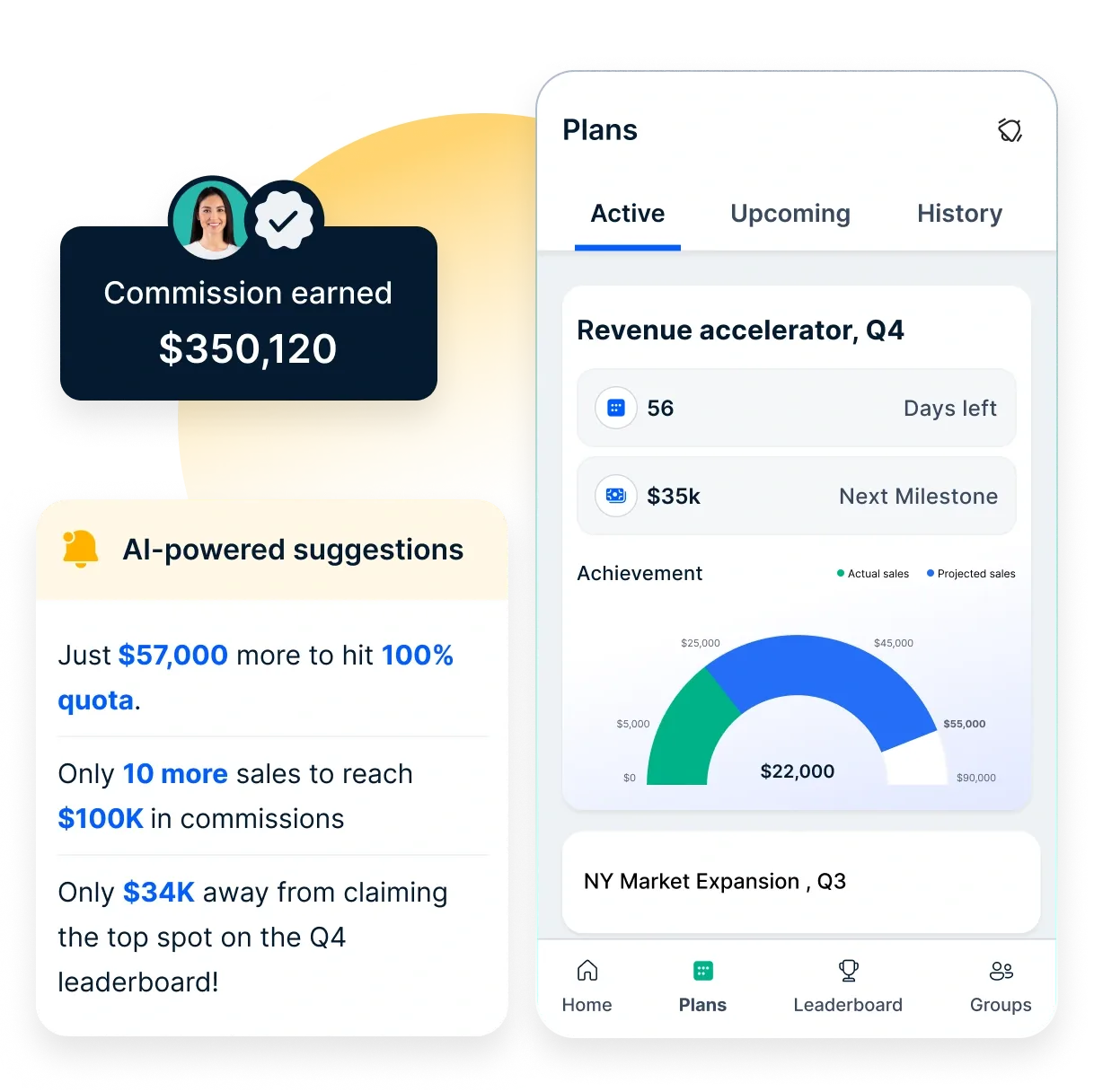Piano di remunerazione dei responsabili delle vendite: Struttura, 7 passi per costruirlo e migliori pratiche
Un piano di retribuzione dei responsabili delle vendite ben strutturato bilancia stipendio base, commissioni e bonus per attrarre i migliori talenti e incrementare le prestazioni di vendita. Scoprite le migliori pratiche per progettare un piano efficace.
In questa pagina
If sales are a team sport, then the sales manager is the head coach—guiding, training, and motivating the team to hit their targets.
A sales manager plays a crucial role in driving revenue, setting individual and team goals, monitoring performance, and keeping morale high, especially when challenges arise. Given the impact of this role, it's essential to attract and retain the right talent with a well-structured sales manager compensation plan that aligns with performance and business objectives.
The last thing you want is to lose a top-tier candidate due to an inadequate sales manager compensation structure. That’s why designing a competitive plan—including salary, commissions, sales manager bonus structure, and sales manager benefits—is a strategic necessity. In this blog post, we will explore the best practices to plan an effective sales manager compensation, and the challenges faced while creating it.
Componenti della struttura retributiva di un direttore vendite
Cerchiamo di capire ogni componente della struttura retributiva dei sales manager con esempi pertinenti per una migliore comprensione dell'argomento.
1. Base salary: Base pay serves as the fundamental basis for a sales manager's income, offering financial security and certainty. It helps motivate the sales team without distractions and retain talent by providing a fixed salary regardless of performance variations.
2. Variable pay: Variable pay is designed to motivate employees for their wonderful performance and target achievements. It includes bonuses and commissions for their dedicated efforts and hard work in achieving business goals leading to higher profits.
If the sales manager has $90,000 per year as a base salary and generates $1 million in sales, they would earn an additional $100,000 as a commission, making their total earnings $190,000 for that year.
This framework guarantees that the best-performing sales managers receive recognition for their work, encourages them to accomplish higher sales goals, and supports the business's development.
3. Pay mix ratios: The percentage of base salary to variable pay is determined by pay mix ratios. A fair ratio is essential; high base pay might discourage managers who are motivated by performance, while overly variable pay could result in unstable income. Sales managers typically have a base salary to variable pay ratio of 60:40 to 70:30.
Now let’s cover the key roles of a manager and how it shapes their comp plan.
Key roles and impact of a sales manager
Sales managers play a pivotal role in driving the success of an organization. Their responsibilities extend beyond just overseeing sales teams; they are strategists, mentors, and collaborators who shape the overall sales trajectory. Their key functions include:
- Leadership: Inspiring and guiding sales teams to meet and exceed targets.
- Strategic planning: Developing and refining sales strategies to align with business goals.
- Mentorship and training: Providing coaching and support to junior sales professionals.
- Cross-functional collaboration: Working closely with marketing and product teams to optimize sales efforts.
- Performance monitoring: Tracking sales performance and ensuring accountability within the team.
- Resource optimization: Managing budgets, sales tools, and personnel efficiently.
- Forecasting and reporting: Analyzing sales trends and communicating insights to executive leadership.
To excel in these roles, a sales manager must possess strong analytical skills, strategic vision, and exceptional communication abilities. But how does it influence the structure? Let’s find out.
How a sales manager’s responsibilities influence commission structures
The diverse responsibilities of a sales manager necessitate a well-structured sales manager compensation plan. A nuanced approach ensures that compensation aligns with both individual and team success.
Here’s how key responsibilities should influence commission structures:
1. Strategic execution
A sales manager pay structure should incentivize long-term strategic thinking rather than just immediate sales. This includes compensation for successful implementation of new sales strategies, expansion into untapped markets, or process enhancements that improve efficiency.
2. Team leadership and mentorship
Since a manager's success is closely tied to their team’s performance, a portion of their compensation should be linked to overall team achievements. This can include team-based bonuses or accelerators based on quota attainment, reinforcing the importance of leadership and development.
3. Cross-functional collaboration
An effective sales manager compensation plan should reward managers for their efforts in working across departments. Bonuses for successful collaboration with marketing or product teams can encourage alignment and result in more targeted sales strategies.
4. Balancing targets with process optimization
While hitting revenue targets is essential, commission structures should also recognize process improvements that contribute to long-term growth. Rewarding system optimizations and efficiency improvements ensures that managers focus on both immediate performance and sustainable success.
A well-structured sales manager compensation plan example should balance short-term sales goals with broader strategic objectives, fostering a culture of leadership, collaboration, and continuous improvement. Let’s check how their compensation plan should look like.
How should a sales manager’s compensation structure look like?
A sales manager’s compensation plan defines their total earnings potential in a year, combining both fixed and variable pay components.
This total salary is often referred to as On-Target Earnings (OTE), which represents what a sales manager can make if they meet all their targets.
OTE: $180,000
Pay mix: 65:35
In this case, the sales manager earns a base salary of $117,000 per year (65% of $180K), with the remaining $63,000 (35% of $180K) coming from commissions—assuming they achieve 100% of their quota.
Unlike sales representatives, whose earnings are tied to the deals they close, a sales manager commission plan is structured around the collective performance of their team. Their quota is the sum of their team’s individual quotas, and to account for this added responsibility, their targets are often adjusted by 10-20%.
A well-structured sales manager compensation plan ensures the right balance between guaranteed income and performance-based incentives. It also includes additional sales manager benefits, such as bonuses, incentives, and sometimes even a sales manager bonus structure to reward overperformance.
How to develop a structered sales manager compensation plan?
Creating a well-structured sales manager compensation plan is key to attracting and retaining top talent. Follow these seven steps to design a plan that aligns with business goals and keeps your sales managers motivated.
Step 1: Establish on-target earnings (OTE)
Determining the right OTE is crucial. Research what competitors offer to ensure your sales manager pay structure is competitive.
If your OTE is significantly lower, you risk losing strong candidates to rival firms. Competitive compensation attracts high-performing managers who can drive revenue growth.
Step 2: Define key performance indicators (KPIs)
Select KPIs that align with your company’s goals. Common KPIs for sales managers include:
- Reducing customer churn and improving retention
- Increasing booking volume
- Enhancing lead conversion rates
- Boosting monthly recurring revenue (MRR)
- Shortening sales cycles
- Generating more client referrals
Clearly defining performance metrics ensures that managers stay focused on driving results.
Step 3: Determine the pay mix
Unlike sales reps, managers typically have a more balanced sales manager pay structure with a higher base salary. This reflects their responsibilities, including team coaching, strategic planning, and deal closure.
For example, if sales reps have a 50:50 pay mix (base salary vs. commission), a manager’s mix might be 60:40 or 70:30. This structure provides stability while still offering incentives for strong performance.
Step 4: Implement a threshold for commissions
Adding a threshold can motivate managers to push their teams harder.
A threshold means that variable pay kicks in only when the team reaches a predetermined performance level. For instance, if a manager’s quarterly commission is $25,000, they may only receive it if their team achieves 85% of its collective sales quota.
Thresholds work best when a structured sales process and an experienced team are in place. For startups or newly built sales teams, thresholds might feel restrictive.
Step 5: Consider offering equity
Equity can serve as a long-term incentive, giving managers a vested interest in the company’s success.
While not necessary for every role, equity can be useful when:
- Hiring top-tier managers who may require additional incentives
- Competing with higher salaries offered elsewhere
- Retaining key talent in a startup environment
Early-stage employees typically receive 1-5% equity, depending on their role and impact.
Step 6: Explore gainsharing incentives
Gainsharing rewards employees when the company meets specific performance goals, such as revenue targets.
A sales manager compensation plan might include additional bonuses for achieving quarterly or annual revenue milestones. This approach aligns managerial efforts with business growth.
Step 7: Ensure legal compliance
Compensation plans should be legally sound to prevent disputes. Sales managers handle various tasks, so vague wording can lead to misunderstandings, particularly regarding performance-based pay or termination clauses.
Work closely with your legal team to review the plan, ensuring it complies with employment laws and best practices.
This model included clear metrics for evaluating sales performance, which streamlined the sales process and enhanced accountability among team members.
As a result, the organization experienced a significant boost in overall sales efficiency and employee satisfaction. Compass led to a more motivated sales force. This shows how significant creating a good compensation plan is.
Ora, dopo aver conosciuto i passi necessari da seguire per un piano di retribuzione efficace, conosciamo le migliori pratiche da seguire per realizzare un buon piano di retribuzione che motivi i responsabili delle vendite a raggiungere gli obiettivi prefissati.
5 strategies for designing an effective sales manager compensation plan
Creating a well-structured sales manager compensation plan is crucial to aligning daily activities with business objectives. The right plan helps attract top talent while ensuring sustainable growth. If the compensation is too low, retaining skilled professionals becomes difficult. If it’s too high, scaling the team may be challenging. Here are five essential strategies to develop a balanced and effective plan.
1. Keep it straightforward
Complexity can lead to confusion. A compensation plan with too many components—such as multiple commission structures, bonuses, accelerators, and other incentives—can make it difficult for sales managers to focus on key objectives.
A clear structure ensures alignment between business goals and compensation. Use simple and transparent formulas, such as “X new contracts per month results in Y dollars,” particularly when implementing a variable pay structure.
2. Leverage historical data
Setting realistic sales targets is critical. When compensation plans are based on unattainable goals or hard-to-measure metrics, they become ineffective.
- Revenue breakdown: new vs. existing customers
- Average lifetime value (LTV) of customers
- Average contract value (ACV)
- Deals won vs. lost
- Cost of selling vs. revenue earned
- Year-over-year sales growth
- Market penetration rate
- Net promoter score (NPS)
Using historical data ensures that targets are realistic, motivating sales managers to exceed expectations.
3. Offer a competitive base salary
Sales managers handle multiple responsibilities, including coaching, strategizing, and overseeing sales teams. A higher base salary allows them to focus on these essential tasks without the constant pressure of hitting quotas.
4. Implement a structured bonus system
Well-defined bonus structures provide clear incentives and drive performance. Various bonus plans can be incorporated into a sales manager compensation plan, such as:
- Direct commission plans – Higher commission rates for high-value deals
- Team bonus structures – Collective sales goals with percentage-based or fixed payouts
- Flat-rate bonuses – Fixed payouts for milestones, such as $250 for every $5,000 in new business
Bonuses should be designed to align with business objectives and motivate sales managers to achieve optimal results. In addition to financial incentives, consider non-monetary perks like team retreats and performance-based recognition.
5. Continuously review and refine
A compensation plan should not be static. It must evolve with market conditions, business growth, and industry trends. Unexpected shifts, such as economic downturns or changes in consumer behavior, can significantly impact sales strategies.
Sales managers are at the forefront of these challenges. Regularly reviewing their compensation plan ensures they feel supported and remain motivated. This principle also applies to compensation structures for other sales leadership roles, including the Chief Revenue Officer (CRO), VP of Sales, and Sales Director.
By consistently refining and improving compensation plans, businesses can drive sustainable growth while keeping their sales leadership engaged and motivated.
How Compass enhances sales manager compensation plans
Compass simplifies the process of designing, implementing, and managing an effective sales manager compensation plan by offering a no-code commission plan designer that enables businesses to create scalable and customizable commission structures in minutes.

- Streamline plan creation – Easily implement structured bonuses, accelerators, spiffs, multipliers, and clawbacks across sales roles without complex manual calculations.
- Automate payouts – Reduce errors and save time by automating commission calculations, ensuring accurate and compliant payouts without manual intervention.
- Enable real-time adjustments – Modify commission plans, apply overrides, and track changes with an integrated audit log, allowing flexibility in strategy refinement.
- Ensure transparency and compliance – Secure manager approvals with built-in digital signatures before rolling out new compensation plans, ensuring alignment and accountability.
- Measure impact and optimize plans – Use advanced analytics like quota attainment, plan effectiveness, payout trends, and benchmarking to track ROI and continuously improve the compensation structure.
By leveraging Compass, businesses can efficiently design sales manager pay structures, automate payouts, and optimize performance-driven compensation strategies, ensuring a scalable and data-backed approach to sales leadership incentives.
Conclusione
Quando si crea un piano di retribuzione per i responsabili delle vendite, è necessario trovare un attento equilibrio tra il mantenimento della sostenibilità dei ricavi e la promozione del successo. Le aziende possono progettare una struttura retributiva che aumenti le vendite e mantenga i top performer aderendo alle best practice ed evitando gli errori tipici. Il successo a lungo termine si ottiene valutando e modificando regolarmente il piano per mantenerlo competitivo e in linea con gli obiettivi aziendali.
For businesses looking to optimize their sales performance management, Compass offers a comprehensive solution and ensures that your sales team is motivated and aligned with your business goals. Discover how Compass can help your organization achieve its sales targets efficiently and effectively, book a demo now!
Domande frequenti
1. What is the typical commission structure for a sales manager?
Sales managers often receive a combination of base salary and performance-based incentives. Common commission structures include team-based bonuses, direct commissions on sales performance, revenue-based commissions, and goal-specific incentives (e.g., achieving quota or exceeding targets). Some companies also offer spiffs, accelerators, and multipliers to drive performance.
2. How are most sales managers paid?
Sales managers are typically paid through a base salary plus variable pay. The base salary ensures financial stability, while bonuses and commissions incentivize performance. The variable pay can be tied to individual, team, or company-wide sales goals, ensuring alignment with business objectives.
3. How much is the salary of a sales manager?
The salary varies based on industry, experience, and location. In the U.S., the average base salary for a sales manager is around $67,500 per year, with total compensation (including bonuses and commissions) often exceeding $100,000 annually for high performers.
4. What are the differences in sales manager compensation based on industries?
Le scale di retribuzione dei responsabili delle vendite possono variare notevolmente da un settore all'altro. Poiché ogni settore ha margini di redditività e dinamiche di vendita distinte, i responsabili delle vendite nei settori tecnologico o farmaceutico, ad esempio, possono essere pagati in commissioni o bonus in misura maggiore rispetto alle loro controparti nei settori della vendita al dettaglio o dei servizi.













